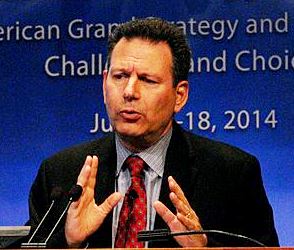A Quote by Henry Giroux
The pedagogy of authoritarianism is alive and well in the United States, and its repression of public memory takes place not only through the screen culture and institutional apparatuses of conformity, but is also reproduced through a culture of fear and a carceral state that imprisons more people than any other country in the world.
Related Quotes
With the rise of new technologies, media, and other cultural apparatuses as powerful forms of public pedagogy, students need to understand and address how these pedagogical cultural apparatuses work to diffuse learning from any vestige of critical thought. This is a form of public pedagogy that needs to be addressed both for how it deforms and for how it can create important new spaces for emancipatory forms of pedagogy.
As a mode of public pedagogy, a state of permanent war needs willing subjects to abide by its values, ideology, and narratives of fear and violence. Such legitimation is largely provided through a market-driven culture addicted to the production of consumerism, militarism and organized violence, largely circulated through various registers of popular culture that extend from high fashion and Hollywood movies to the creation of violent video games and music concerts sponsored by the Pentagon.
One culture I find fascinating to juxtapose against American culture is the culture of Germany. They've gone through a long process through their art, poetry, public discourse, their politics, of owning the fact of their complicity in what happened in World War II. It's still a topic of everyday conversation in Germany.
While the foreign policy elite in Washington focuses on the 8,000 deaths in a conflict in Syria – half a world away from the United States – more than 47,000 people have died in drug-related violence since 2006 in Mexico. A deeply troubled state as well as a demographic and economic giant on the United States’ southern border, Mexico will affect America’s destiny in coming decades more than any state or combination of states in the Middle East.
The really interesting moment will be when you have a critical mass of people engaging through the networks, more than through the press and TV. When that happens, the culture of politics has to change, moving away from controlled one-way messages towards a political culture that is more questioning.
I think we are becoming more and more linked, and before long, we'll all be one culture. It's happening in every field, not just fashion. Actually, I think the only hope for peace is if culture is homogenized. Unfortunately, money seems to be the only solution to political disagreements. If we are all linked through culture and trade, it won't be worth fighting each other.
We have to remember examples of many artists of conscious rap who have been coopted by the Department of State of the United States to be cultural ambassadors in different parts of the world, like Syria, like other parts of the Middle East, including conscious Islamic-American rappers that are representing an international political agenda for the United States through cultures more affable for people of color in other parts of the world.
There is a deeper truth expressed in the unity of the United States. Implicate in the union of our country is the union of all people. All people are essentially one. The world is interconnected not only on the material level of economics, trade, communication, and transportation, but innerconnected through human consciousness, through the human heart, through the heart of the world, through the simply expressed impulse and yearning to be and to breathe free.
In many respects, the United States is the freest country in the world. I don't just mean in terms of limits on state coercion, though that's true too, but also in terms of individual relations. The United States comes closer to classlessness in terms of interpersonal relations than virtually any society.

































